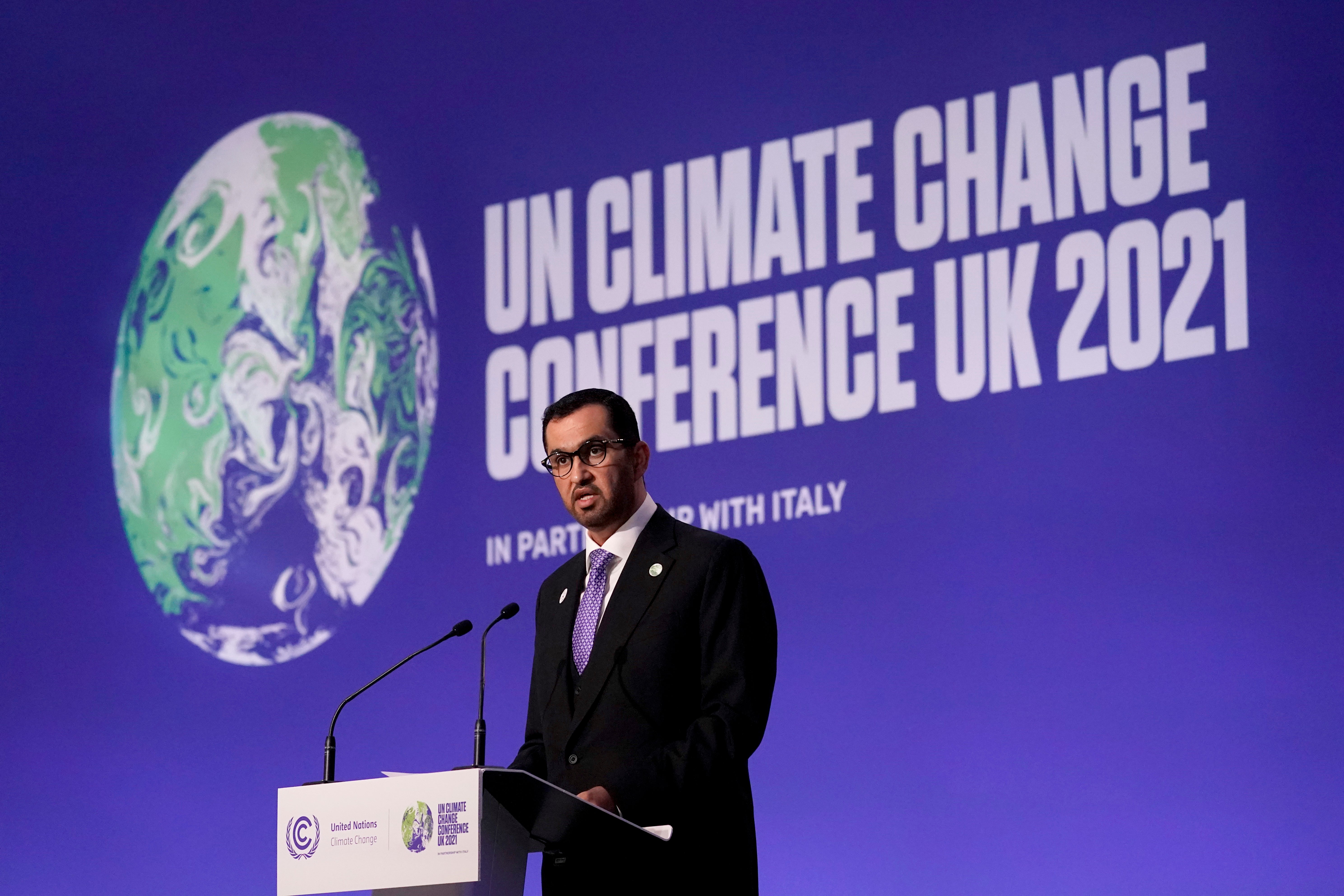Charting a path to a renewable energy future
There needs to be a bridge between our current energy needs and the vital changes that need to be made, writes Chris Blackhurst


There is outrage among climate campaigners at the appointment of Sultan Ahmed Al Jaber as president of this year’s Cop28 UN climate summit in Dubai.
Al Jaber wore two hats. He’s UAE’s minister for industry and advanced technology, and he is chief executive of the Abu Dhabi National Oil Company (ADNOC). Now he wears three, as host of the vitally important global climate talks.
How can he? How can he run one of the world’s biggest oil companies and at the same time, play the role of “honest broker” at the gathering, trying to find agreement between arguing governments, setting the direction of travel of the fortnight-long conference and determining what issues should receive greatest priority?
Taking his elevation at its face, activists are right to be furious. Teresa Anderson of ActionAid maintains Al Jaber’s chairing of Cop28 “goes beyond putting the fox in charge of the henhouse”.
Romain Ioualalen, global policy manager at the campaigning body, Oil Change International, says it is “tantamount to putting the head of a tobacco company in charge of negotiating an anti-smoking treaty”.
More accurate, I think, might be to stretch that analogy and say it is like putting the head of a tobacco company that is investing heavily in safer smoking and smoking alternatives in charge of negotiating an anti-smoking treaty.
To condemn Al Jaber purely on the basis of his ADNOC position is to ignore that he was founding CEO of Masdar, one of the world’s biggest renewables investors; he is still Masdar’s chairman; his ministerial job has seen him boost UAE’s drive towards becoming a major nuclear power producer; UAE was the first Middle East country to sign up to the Paris Climate Agreement; and the first Middle East country to set a target of reaching zero emissions by 2050.
True, Al Jaber comes from a part of the world known for oil and gas, and UAE is in the thick of that, a prime beneficiary of fossil fuel production. However, it’s investing heavily in renewables and clean tech – $40bn over the past 15 years, plus a commitment agreed with the US in November to spend an extra $100bn. These are not figures to be sniffed at.
There is, and has to be, a coming together of fossil fuels and renewables. The producers of the former, certainly the most enlightened, realise their products have to be made cleaner.
“Every serious hydrocarbon producer knows the future, in a world of declining use of fossil fuels, is to be low cost, low risk and low carbon,” says David Goldwyn, the former US State Department special envoy for energy. “The only way to ensure we do this is to have industry at the table.”
Mistrust and downright animosity are giving way to mutual respect and recognition, based on the realisation they cannot live without each other. Enticing as it may be for the most extreme climate change warriors, the world just cannot ditch fossil fuels overnight and switch to renewables and continue to function. It is impossible.
For this new pragmatism, the person responsible is one Vladimir Putin. It was his invasion of Ukraine that hardened thinking, highlighting, like it or not, the world simply cannot live completely without oil, gas and coal. Not yet.
There has to be a bridge and that means making fossil fuels cleaner, while at the same time pushing ahead to increase renewables capacity. It also means being more accepting of some renewables, appreciating they have a place. So nuclear power is back in vogue, as is liquefied natural gas or LNG.
Russia’s onslaught against Ukraine brought energy security to the fore. Suddenly, every nation that relied upon energy from Russia and Ukraine was forced to examine its supply, to find other fuel sources. And they had to be cost-efficient. They were faced with what is known as “the energy sustainability trilemma” – how to balance energy reliability, affordability and sustainability.
Al Jaber made plain at the recent Atlantic Council Global Energy Forum where he is coming from. “We are way off track,” he said of the need to lower emissions. “The world is playing catchup when it comes to the key Paris goal of holding global temperatures down to 1.5C. And the hard reality is that in order to achieve this goal, global emissions must fall 43 per cent by 2030. To add to that challenge, we must decrease emissions at a time of continued economic uncertainty, heightened geopolitical tensions and increasing pressure on energy.”
He called for “transformational progress … through game-changing partnerships, solutions and outcomes”. He is seeking a tripling of renewable energy generation, and more than double low-carbon hydrogen production for industrial sectors, which have the hardest carbon footprint to abate.
“We will work with the energy industry of accelerating the decarbonisation, reducing methane and expanding hydrogen,” said Al Jaber. “Let’s keep our focus on holding back emissions, not progress.”
If Al Jaber is indeed a delighted fox put in charge of the henhouse, so far he has a funny way of showing it.
Join our commenting forum
Join thought-provoking conversations, follow other Independent readers and see their replies
Comments
Bookmark popover
Removed from bookmarks